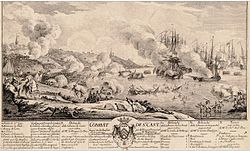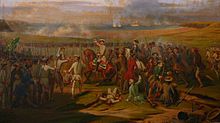Battle of Saint-Cast
| date | September 11, 1758 |
|---|---|
| place | Saint-Cast |
| output | French victory |
| Parties to the conflict | |
|---|---|
| Commander | |
| Troop strength | |
| 12,370 soldiers, 105–130 ships | approx. 7000 soldiers |
| losses | |
|
1160 dead, approx. 300 drowned, 732 prisoners |
155 killed, 340 wounded |
European theater of war:
Pirna * - Lobositz * - Prague * - Kolin * - Hastenbeck ** - Groß-Jägersdorf * - Moys * - Hastenbeck * - Roßbach * - Breslau * - Leuthen * - Rheinberg ** - Krefeld ** - Domstadtl * - Olomouc * - More ** - Zorndorf * - Saint-Cast - Hochkirch * - Bergen ** - Kay * - Minden ** - Kunersdorf * - Lagos *** - Hoyerswerda * - Bay of Quiberon *** - Maxen * - Koßdorf * - Landeshut * - Emsdorf ** - Warburg ** - Liegnitz * - Berlin * - Kampen Monastery ** - Torgau * - Döbeln * - Vellinghausen ** - Ölper ** - Burkersdorf * - Reichenbach * - Freiberg *
(* Third Silesian War , ** western theater of war - Great Britain / Kur-Hanover and other allies against France , *** naval battle )
American theater:
Seven Years War in North America
Monongahela - Carillon - La Belle Famille - Québec - Beauport - Abraham Plain - Sainte-Foy - Restigouche
Asian theater:
Cuddalore - Negapatam - Pondicherry - Wandiwash - Manila
The Battle of Saint-Cast took place on September 11, 1758 and was one of the few battles of the Seven Years War that was fought on French soil. An amphibious British army was attacked and defeated by French troops under the command of Emmanuel-Armand de Vignerot du Plessis de Richelieu, duc d'Aiguillon , after a raid on the coast of Brittany during embarkation at Saint-Cast-le-Guildo .
prehistory
On September 3, 1758, the frigate Renoncule sighted a large English naval formation off the coast of Brittany and alerted the commander of the city of Saint-Malo . Post at Cape Fréhel confirmed the sighting of the British shortly afterwards with signal cannons. On September 4, 1758, the British infantry and 200 dragoons landed at Saint-Lunaire without encountering any resistance. The following day, Bligh and his troops tried to approach Saint-Malo from the south, but returned unsuccessful because he lacked the means to cross the River Rance . On the same day, an Estafette reached the Duc d'Aiguillon. Aiguillon immediately began to pull troops together in order to be able to counter the landing. On September 6, a storm forced the British fleet to a sheltered anchorage to avoid the mouth of the Arguenon . The British land troops therefore marched on September 8, 1758 separately from the fleet from Saint-Lunaire to the Arguenon. When the British arrived at the Arguenon, the first fighting broke out. Breton militias occasionally fired musket shots from the opposite bank of the river. Bligh initially had no information on the strength of the troops on the other side of the river and only decided on September 9th to force the crossing of the Arguenon. Finally, on September 11, the loading of the material (horses and artillery) and the embarkation of the landing troops began. A rearguard, under the command of Major-General Drury, remained on the beach and was composed of the elite regiments and grenadiers of the expeditionary army. In the meantime, however, D'Aiguillon had succeeded in gathering a sufficiently large army to be able to attack the troops remaining on the beach. He formed his approximately 7,000 men in three large attack columns.
Course of the battle
The French began to fire the troops on the coast around the landing craft with artillery. The columns attacked the British rearguard. The embarkation of the British troops then developed chaotically. A soldier of the 68th Regiment of Foot reports in his memoir that all order was lost and everyone was just trying to reach the nearest ship and thus save their life. In purely mathematical terms, the French artillery with 10 cannons and 8 mortars was numerically inferior to the British. However, the British artillery had already been loaded and the ship's cannons, with the exception of a few mortar ships, could only provide limited artillery support to the troops on the beach. The British rearguard initially held back the attack columns with targeted salvos, but were then overrun. Many British soldiers drowned trying to swim in a panic to a rescue ship.
consequences
About 600 French soldiers were assigned to bury the dead after the battle. The French dead were buried in consecrated ground in the Saint-Cast cemetery, whereas the English, as Protestants, were merely buried in the dunes. After the disastrous embarkation of the land troops, the British fleet stayed off the coast of Saint-Cast until September 14, 1758. The inability of the French navy to prevent this showed a great weakness of the coastal defense of the Kingdom of France.
As a result of the Saint-Cast fiasco, Great Britain in Europe increasingly focused on the land war in north-west Germany. No further attempts to land on the French mainland were made. As a result of the defeat, numerous pamphlets appear criticizing the raids on the French coast as expensive and ineffective:
What happen'd more I cannot say, let Tears proclaim the rest, /
And Heaven receive these Grenadiers that perish'd at St. Cass, /
Like Soldiers brave, they fought, they dy'd, and proved their Ancient Race,
May those be d [... am] n'd that brought them there, I'll say it to their face.
To England what Disgrace, Disgrace, to England what Disgrace,
May those be d [... am] n'd that brought them there, Ill say it to their Face.
Expedition. an ODE, To the Tune of the British Grenadiers [...], London [1759?], verse XII.
Louis XV ordered a 'Te Deum' in Notre-Dame de Paris on the occasion of the victory and expressed his appreciation for the Duc d'Aiguillon. The Brittany estates followed suit and on September 18, 1758, in Saint-Brieuc, decided to have a bronze medal minted to commemorate the victory of Saint-Cast.
reception
In 1858 a memorial was erected in Saint-Cast in memory of the victory over England. In 1956 the artist Bernard Locca created a painting of the battle, which is now owned by the municipality of Saint-Cast. In 2008, Saint-Cast-le-Guildo commemorated the 250th anniversary of the battle through lectures and several publications.
swell
- [Eyewitness account of a soldier of the 68th Regiment of Foot]: A soldier's journal containing a particular description of the several descents on the coast of France last war; with an entertaining account of the islands of Guadaloupe Dominique, & c. and also of the isles of Wight and Jersey. To which are annexed, Observations on the present state of the army of Great Britain , London 1770.
- A genuine narrative of the enterprise against the stores and shipping at St. Maloes, from the letters of a person of distinction in the service [...] , London 1758.
- An Authentic Account of our last attempt on the Coast of France by an Officer who miraculously escaped being cut to pieces, by Swimming to a Boat at a considerable distance from the shore , London, 1758.
- An Impartial Narrative of the Last Expedition to the Coast of France by an Eyewitness , London 1758.
- Expedition to ODE, To the Tune of the British Grenadiers. Printed for W. Taylor, facing the Opera-House, in the Haymarket, London [1759?].
literature
- Eric Rondel (ed.): Bataille de Saint-Cast 11 septembre 1758. Les invasions anglaises en Bretange , Sables-D'or-les-Pins 2008.
- Paul Ladouce: La Bataille de Saint-Cast , Guingamp 2007.
- Yann Lagadec / Stéphane Perréon with the assistance of David Hopkin: La bataille de Saint-Cast (Bretagne, September 11, 1758). Entre histoire et mémoire . Préface d'Olivier Chaline (Collection “Histoire”), Rennes 2009.
- Auguste Lemasson: La descente des Anglais à Saint-Briac et leur défaite à Saint-Cast en 1758 , Paris 2007.
Local guide to the battle of Saint-Cast
- Deux Balades au Coeur de l'Histoire de Saint-Cast Le Guildo , published by the Mairie de Saint-Cast le Guildo (Section Patrimoine), [Saint-Cast-le-Guildo] 2008.
Individual evidence
- ↑ Lagadec / Perréon, bataille de Saint-Cast, pp. 266–268.


